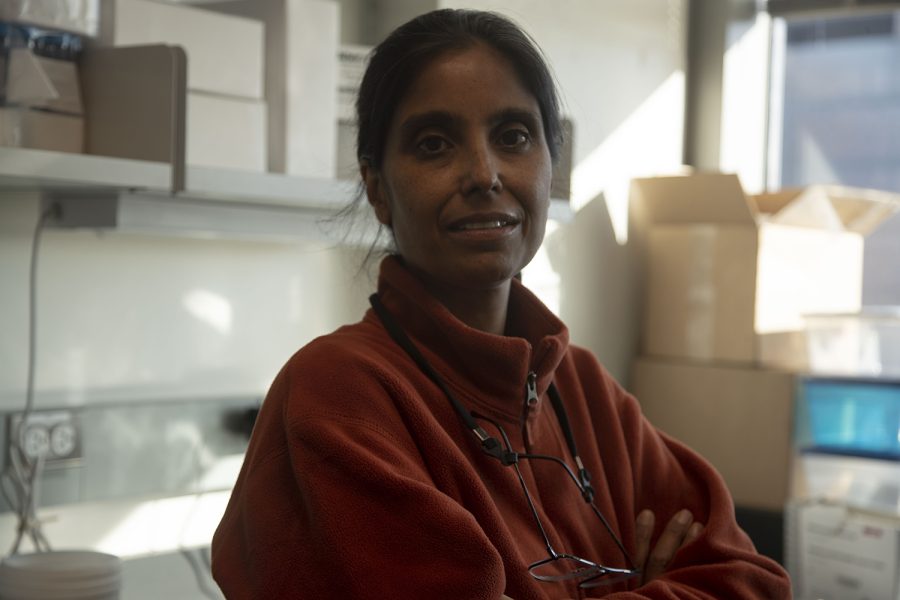UI researchers discover memory of stress on roundworm mothers transfers to offspring
A group of UI researchers exposed roundworm mothers to heat shocks, discovering the memory of the episodes was transferred to their offspring.
Associate professor at the University of Iowa, Veena Prahlad, poses for a portrait on Monday, Oct. 25, 2021. Prahlad is researching about mothers’ traumatic experiences transferred onto children.
October 27, 2021
Roundworm mothers who are exposed to heat stress transfer the memory of that stress to their offspring, University of Iowa researchers have found.
Researchers from the UI Department of Biology published a paper in the journal Molecular Cell, explaining the transfer and how this ultimately strengthens the offspring’s immunity to stress.
Veena Prahlad, a UI associate professor of biology and co-author of the paper, said her team subjected roundworm mothers to heat stress and that the more intense the heat, the more likely it affected not only their direct offspring, but their grandchildren, as well.
“What we discovered was that when an animal senses stress — and this was in the roundworm — it senses that the temperature around it is beginning to increase using its nervous system,” Prahlad said.
From there, she said, the protein Heat Shock Factor 1 — which exists in all organisms and determines what genes turn on in response to stress — establishes a memory of previous stress exposure in the roundworms’ eggs.
Prahlad said this is atypical of eggs as they undergo serves to erasure all traces of prior activity in genes.
“When the egg is fertilized in almost all cases, the memory of prior gene expression is removed, is taken away, so the egg sort of starts pristine, if you will,” she said.
In sensing temperature increase, Heat Shock Factor 1 is activated in the early eggs, Prahlad said. She said her team wanted to discover if the offspring exhibited any physiological changes when they grew up in normal temperatures.
“The next generation had a sort of response that was much more what you’d expect if the animal was going to be living under chronically stressful situations,” she said.
Prahlad added that they are still investigating why this rare process of retained stress memory happens, but she hinted the reason might be for better adaptability to stressful environments.
“They change their stress strategy and now require or utilize a method that gives them protection against many different kinds of stressors, it gives them a longer protection, a deeper protection if you will,” she said.
UI postdoctoral research scholar Srijit Das, first co-author on the paper, said although the offspring is born stress-resistant, there may also be some tradeoffs, such as sterility in the offspring whose mothers suffered heat stress.
Prahlad explained that this research might be a step towards a better understanding of how other organisms, including humans, pass stress memory onto their children.
“We know that there can be generational effects of stress in multiple organisms. In fact, plants use this all the time to decide when to flower,” she said. “We know cases in humans where there’s a record that the maternal effect of stress exposure has a consequence for one or two generations down the line.”
Das said the Dutch Hunger Winter is a notorious example of stress memory being passed down to human offspring from their mothers, occasionally giving them metabolic disorders.
Many previous researchers have reported memories of stress in offspring, Das said. Unlike his research team, however, they have not discovered the mechanism that establishes these memories.
Among the advantages of studying roundworms are its lifespan and biological makeup, he said. A roundworm lives roughly 20 to 30 days, and their children are expected to be born within four to five days.
He said roundworms are also transparent enough that his team can see inside their bodies, making genetic manipulation much easier.
UI biology graduate student Sehee Min, another co-author on the paper, said this is the first professional paper she has been involved in.
Required to write a paper for her degree, Min said the experience taught her many things, such as how to make a graph, write professionally and analyze and incorporate data.
She will co-author another paper with Prahlad, she said, that aims to clearly detail how stress memories transfer.
“Right now, my project is doing the same procedure, but I want to know the much more fundamental reason why they inherit it, so what is the function of inheritance from mother to offspring,” she said.
The Daily Iowan made clarifying corrections in this article since its published date. The DI also incorrectly reported this article’s headline, which did not specify what kind of stress roundworm mothers experience.



